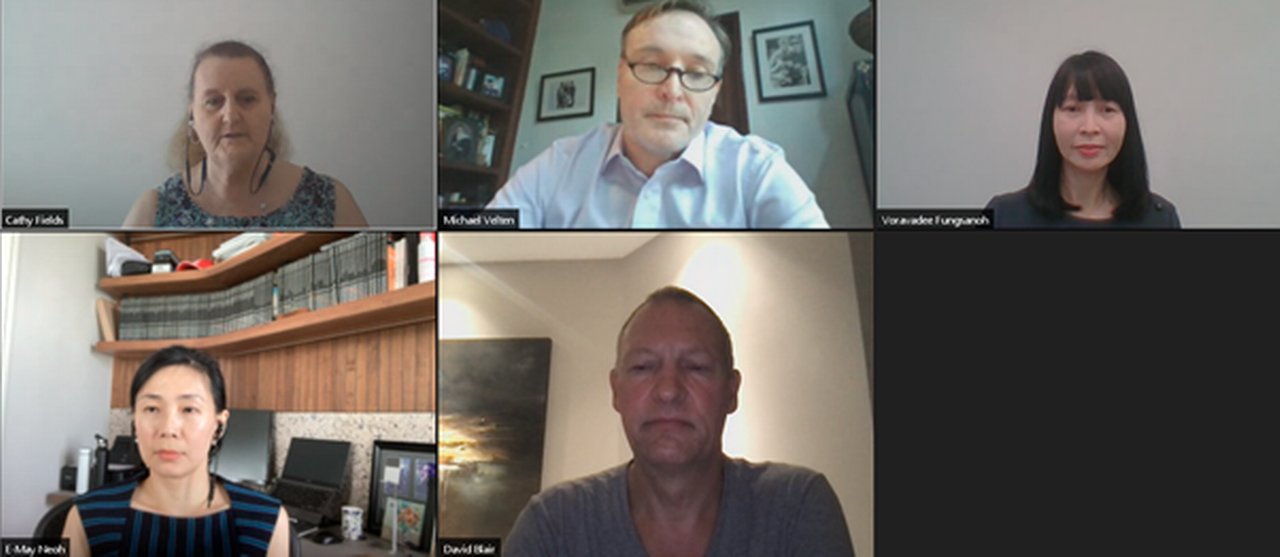28 July 2021
In a webinar hosted by The Economist as part of its Global Treasury Leaders programme and supported by Deutsche Bank, two corporate treasurers shared on the special challenges that the region presents when setting up an in-house bank. flow reports
MINUTES min read

In April 2021, flow set out how the onset of the Covid-19 pandemic had made centralisation a top priority for many corporate treasurers, while strengthening the case for using an in-house bank (IHB).1
However, setting up and maintaining an IHB in the Asia Pacific region comes with several challenges and is “not for the faint of heart” warns Cathy Fields, Assistant Treasurer and Senior Director of Global Risk Management of Hitachi Vantara LLC.
Fields and Voravadee Fungsanoh, Head of Cash Management and Payments APAC at the Hong Kong office of Siemens AG, represented treasury on the panel of ‘Extending Your In-House Bank Services in APAC’, a recent webinar hosted by The Economist and supported by Deutsche Bank. They were joined by Michael Velten, a Tax Partner at Deloitte and E-May Neoh, Asia Head of Liquidity and Balance Sheet, Cash Management for Deutsche Bank Corporate Bank, Singapore.
Moderating the session was Managing Director of Acarate, David Blair, who opened with an online poll that asked audience members what point they had reached in their IHB preparations. Half were either already active (44%) with, or were implementing (6%), an IHB.
What is your status with an In House Bank?
Poll Results (single answer required):
- Active 44%
- Implementing 6%
- Investigating 21%
- None 29%
Extents and limits
Hitachi’s developing IHB, currently in its early stages, is planned as a major global initiative for the parent company in Japan, said Fields. The full extent of its proposed scope and structure has been under review, together with deciding which functions the group wants the IHB to encompass.
“We’re considering a single in-house cash structure, based in Singapore for borrowing and lending within the group, for FX, risk management and concentration of cash – and potentially also including payments-on-behalf-of (POBO) in the structure,” Fields revealed.
The proposed scope is enormous and opens itself up to a multitude of complexities, she added – which required those involved to ask the basic question, “what are we seeking to accomplish with an IHB?”
Hitachi had considered further extending the scope to include receipts-on-behalf-of (ROBO) but “once we began evaluating the basics that would be involved we decided that, at least for now, POBO would be enough and ROBO can wait for a later date”.
Siemens’ IHB is rather more established, observed Blair and Fungsanoh reported that operating from Hong Kong it covers the group’s activities in 15 countries across Asia. Centralised Treasury activity has run from Hong Kong since 2014 and covers a range of services from operating the group’s payments factory and monitoring liquidity to providing a hedging strategy for FX. Perhaps most importantly it also ensures that various governance requirements across the region are complied with, as these can – and do – vary from country to country and are also liable to change at short notice.
“The scope of what we can do with an IHB is limited to some extent, as complying with regulation in some countries is extremely difficult”
While Siemens has probably one of the most developed IHBs and Hitachi is still in the early stages of setting theirs up, both treasurers agree that regulatory compliance in each APAC country presents one of the greatest challenges, alongside dealing with a variety of different environments. “The scope of what we can do with an IHB is limited to some extent, as complying with regulation in some countries is extremely difficult,” admitted Fields. “A solution that otherwise works well for most of the region often won’t fit in every country. For example, some impose specific issues around privacy, which requires you to do your homework from the very outset.
“And that’s where we’ve run up against problems – periodically we run into implementation issues and we realise it’s because we didn’t do our homework from the very start on activities such as cross border cash movements, FX or withholding tax.”
Such obstacles have caused the group to sometimes wonder “whether we might be biting off more than we can chew” admitted Fields – to the extent that Hitachi has questioned whether a regional structure might ultimately make more sense than a global one for its IHB.

Top row: Panellists Cathy Fields (Hitachi Vantara), Michael Vetten (Deloitte) and Voravadee Fungsanoh (Siemens); Bottom row: E-May Neoh (Deutsche Bank) and session moderator David Blair
Fungsanoh agreed that some countries are very highly regulated and Siemens has to adjust its approach according to countries’ particular restrictions. “In the Philippines, Thailand, Malaysia, Indonesia and Vietnam for example, you’re more limited by the various requirements imposed by the central bank, which are also liable to change periodically. And in some countries, payment processing is hampered by the fact that we’re still limited to cheque payments.”
Even with the restrictions on mobility during the pandemic and an acceleration in the use of digital signatures, some countries have insisted on the continued use of traditional ‘wet’ signatures.
The second audience poll asked what the major challenges are for IHBs in the APAC region and unsurprisingly regulation led comfortably, being cited by 93% of respondents.
What are the major problems with IHBs in APAC?
Poll Results (Multiple answers allowed):
- Tax 55%
- Regulations 93%
- Banking 12%
- Other 5%
Differing tax regimes
As a Tax Partner at Deloitte and adviser to IHBs, Velten confirmed that the issue of withholding tax occurs regularly. “Tax regimes are at differing levels of maturity across various APAC countries and the approaches to tax audits and administration vary widely,” he added.
“Recent years have seen a resetting of international tax rules, such as transfer pricing regimes and enhanced requirements applying to transfer pricing documentation that requires country-by-country reporting. So that needs more audits and also more transfer pricing adjustments.
“The development of these new requirements has in itself been a challenge. With international tax reset, we’ve seen the tightening of capitalisation regimes and mechanisms on tax relief.”
Deutsche Bank’s E-May Neoh agreed that the issue of tax is getting steadily more complicated although individual challenges vary from company to company. “The centralisation journey of Siemens is, for example, quite mature compared to those of many other companies,” she commented.
In the case of Siemens, while there might be further work yet to be done, as the foundations of the IHB are already firmly in place dealing with issues typically takes less time. That’s an advantage when “in Asia, regulation is all over the place so a global structure is challenging – and made even more so as the rules change regularly.”
“In some countries the requirements of their central bank can be very specific and we have to approach them with a clear and transparent explanation of exactly what it is that we want to do”
Fungsanoh said that Siemens has learned to adjust its approach in the region’s more regulated countries and also the tools that it uses. “In some countries the requirements of their central bank can be very specific and we have to approach them with a clear and transparent explanation of exactly what it is that we want to do.
“There may be tight control imposed on capital outflows, which means obtaining the central bank’s approval – although it should be added that many central banks are ready and willing to help. But we have to keep fully up to date with each country’s regulation, especially when we’re aiming to centralise processes.”
Fields added that Hitachi has identified “which of the countries we’ll need to present our case to the central bank to ensure that we get the proper approvals for what we want to do, say in FX management or moving capital cross-border”.
“We’ve mapped out most of those cases and also distinguished between those for which we can act solo and those where we’ll use a banking partner,” she added.
Neoh recommended that when the IHB is operating in a highly regulated country “before you do anything else, ask yourself what value you are trying to extract. Is it, for example, liquidity, repatriation of dividends or something else entirely?”
China, which has been steadily liberalising its financial markets and opening up now has a regulatory checklist that is fairly predictable, she added. “It’s good to periodically check up on what the current central bank requirements are in other countries, to make things easier.”
Cost versus benefit
Another question from the audience for panellists was, given the hassles and complexity that can attach to establishing an IHB in the APAC region, whether the effort is ultimately worth it and there is an identifiable cost-benefit balance. Fungsanoh said that Siemens assesses cost versus benefit for its IHB operations generated by centralisation and whether, besides cost saving, it increases operation efficiency, control and support on risk mitigation.
“The value that you get from centralising cash is locating where it can be used most effectively and eliminating the need for cross-border movements is highly efficient,” said Fields. “The consolidation of cash gives you much better leverage with your banking partners. So the efficiencies that you derive from centralising quickly unlock value.”
Asked how many banking partners a company should engage for its IHB, she suggested it should be “no more than the minimum number needed to support your IHB structure. The companies within our group have achieved a lot of autonomy over the years, but are coming to recognise the value of centralising.”
Fungsanoh said that Siemens would need more bank partners for its FX for competitive pricing, “but when we want to monitor liquidity, to have a small number of banking partners is helpful. Ultimately it depends on the business requirements.”
Neoh gave a measured response to the suggestion that an international bank such as Deutsche Bank might welcome the message that local banks can sometimes work better for an IHB. “A global bank plays a major role in helping with the centralising of cash and liquidity and a local bank helps with the task of meeting a particular country’s regulatory requirements,” she suggested. “But a lot of companies are going down the bank-agnostic route.”
Levelling the field on tax
Returning to the issue of tax, Velten noted that since 2017 the OECD has been working on the new Base Erosion and Profit Sharing (BEPS II) regime and more recently the G7 reached agreement on a minimum global corporate tax rate of 15%, which has since been taken further at the 9-10 July G20 meeting2 – a 2023 deadline has been proposed for its introduction.
“As both Hong Kong and Singapore have concessionary tax rates, you’ll see this suggested minimum figure of 15% have an impact and Singapore’s Minister of Finance confirmed that the required standards will be met. So there will be lots of developments over the months ahead towards implementation.”
Moderator Blair wondered to what extent an IHB is a tax play? He added that Hong Kong and Singapore are APAC’s two global cash management centres for IHBs, with Australia, New Zealand and Tokyo posing little competition.
“When you select a location you have to look very closely at the tax issues,” said Fields. “It will be interesting to see how the proposed minimum global tax rate will affect the existing structures and what the impact will be.”
And if Singapore’s minimum tax rate was to double to 15% would Hitachi Vantara move out? “No, but other locations may well become more attractive when choosing where to place your bank account,” replied Fields.
Nor would Siemens relocate its APAC IHB from Hong Kong were the tax rate to double. “We’d look at a whole range of relevant factors and also consider where our business operations are centred,” reflected Fungsanoh.
Takeaways from the session include:
- For many corporates the Covid-19 pandemic has made centralisation a priority and strengthened for using an in-house bank, but setting up and maintain an IHB in the Asia Pacific region presents challenges
- Homework is vital before attempting either move in APAC: a solution that otherwise works well for most of the region often won’t fit in every country
- Consolidating cash gives corporates better leverage with their banking partners and the efficiencies derived from centralising quickly unlock value

Extending your In-House Bank Services in APAC, a webinar hosted by The Economist as part of its Global Treasury Leaders programme and supported by Deutsche Bank, took place on 8 July 2021
Go to Corporate Bank EXPLORE MORE
Find out more about products and services
Go to Corporate Bank Go to Corporate BankStay up-to-date with
Sign-up flow newsbites
Choose your preferred banking topics and we will send you updated emails based on your selection
Sign-up Sign-upSubscribe Subscribe to our magazine
flow magazine is published annually and can be read online and delivered to your door in print
You might be interested in
Macro and markets, Trade finance and lending {icon-book}
Heirs of Lac Long Quan Heirs of Lac Long Quan
CASH MANAGEMENT
Doing more with less Doing more with less
More than a year on since the onset of Covid-19, the pandemic has made centralisation a top priority for many corporate treasurers and strengthened the case for using an in-house bank, reports flow's Graham Buck


